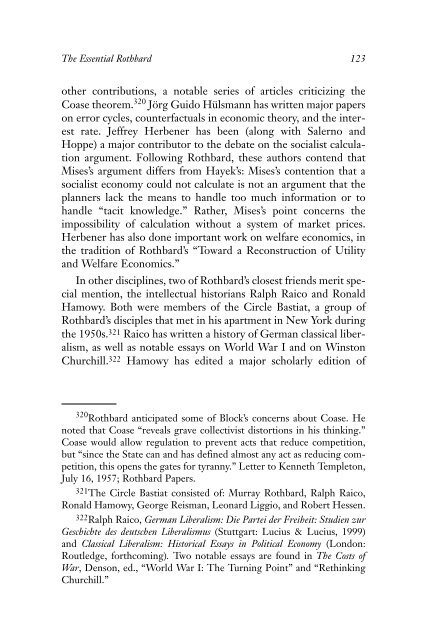The Essential Rothbard - Ludwig von Mises Institute
The Essential Rothbard - Ludwig von Mises Institute
The Essential Rothbard - Ludwig von Mises Institute
Create successful ePaper yourself
Turn your PDF publications into a flip-book with our unique Google optimized e-Paper software.
<strong>The</strong> <strong>Essential</strong> <strong>Rothbard</strong> 123<br />
other contributions, a notable series of articles criticizing the<br />
Coase theorem. 320 Jörg Guido Hülsmann has written major papers<br />
on error cycles, counterfactuals in economic theory, and the interest<br />
rate. Jeffrey Herbener has been (along with Salerno and<br />
Hoppe) a major contributor to the debate on the socialist calculation<br />
argument. Following <strong>Rothbard</strong>, these authors contend that<br />
<strong>Mises</strong>’s argument differs from Hayek’s: <strong>Mises</strong>’s contention that a<br />
socialist economy could not calculate is not an argument that the<br />
planners lack the means to handle too much information or to<br />
handle “tacit knowledge.” Rather, <strong>Mises</strong>’s point concerns the<br />
impossibility of calculation without a system of market prices.<br />
Herbener has also done important work on welfare economics, in<br />
the tradition of <strong>Rothbard</strong>’s “Toward a Reconstruction of Utility<br />
and Welfare Economics.”<br />
In other disciplines, two of <strong>Rothbard</strong>’s closest friends merit special<br />
mention, the intellectual historians Ralph Raico and Ronald<br />
Hamowy. Both were members of the Circle Bastiat, a group of<br />
<strong>Rothbard</strong>’s disciples that met in his apartment in New York during<br />
the 1950s. 321 Raico has written a history of German classical liberalism,<br />
as well as notable essays on World War I and on Winston<br />
Churchill. 322 Hamowy has edited a major scholarly edition of<br />
320<br />
<strong>Rothbard</strong> anticipated some of Block’s concerns about Coase. He<br />
noted that Coase “reveals grave collectivist distortions in his thinking.”<br />
Coase would allow regulation to prevent acts that reduce competition,<br />
but “since the State can and has defined almost any act as reducing competition,<br />
this opens the gates for tyranny.” Letter to Kenneth Templeton,<br />
July 16, 1957; <strong>Rothbard</strong> Papers.<br />
321<strong>The</strong> Circle Bastiat consisted of: Murray <strong>Rothbard</strong>, Ralph Raico,<br />
Ronald Hamowy, George Reisman, Leonard Liggio, and Robert Hessen.<br />
322Ralph Raico, German Liberalism: Die Partei der Freiheit: Studien zur<br />
Geschichte des deutschen Liberalismus (Stuttgart: Lucius & Lucius, 1999)<br />
and Classical Liberalism: Historical Essays in Political Economy (London:<br />
Routledge, forthcoming). Two notable essays are found in <strong>The</strong> Costs of<br />
War, Denson, ed., “World War I: <strong>The</strong> Turning Point” and “Rethinking<br />
Churchill.”

















